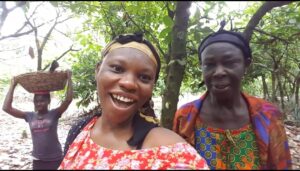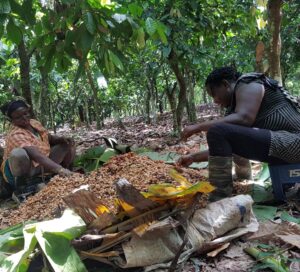I am a granddaughter of a cocoa farmer. I love cocoa. I have lived a cocoa life before. Anything about cocoa brings such a great nostalgia for my childhood. I used to go to the farm with my grandmother and help her plant her cocoa seedlings. I offered a helping hand in the picking up of the pods, scooping of the beans from the pod and drying the cocoa beans. I understand the entire process cocoa goes through before it is dried, sold and finally exported to Europe, Asia, etc. for our favourite chocolates and other products.

Why am I sharing this experience with you? Anytime I go back to my hometown and watch my people hustle and juggle through the entire cocoa process, I ask myself, how much is all this struggle worth? I once accompanied my aunt to weigh her cocoa beans at a shed and was angry about the amount of money she received at the end of all the hard work. The puzzle we have failed to answer all these years is: How liveable is the income for cocoa farmers in Ghana?
Oxfam conducted research in 2022 to analyse income trends of cocoa farmers and existing strategies and interventions implemented by cocoa and chocolate companies operating in Ghana to raise the income of cocoa farmers in their supply chains. The study, which was titled ‘Towards a living income for cocoa farmers in Ghana: Assessing companies’ efforts to date’ indicated that “farmers on average reported a decline in cocoa production over the past three harvesting seasons. Compared to three years ago, the average number of bags of cocoa produced by farmers decreased by 23.9 percent, from 13.57 bags (62kg) three years ago to 10.33 bags during the 2021/22 season”.
Two cocoa farmers, Akwasi Poku, 54 and Afia Antwiwaa, 45 from Jacobu in Ashanti Region further underscored the difficulties facing them and those who depend on cocoa for their livelihoods.
”I had about eight bags last season; I have so far gathered about three and a half bags, and may get a maximum of five and a half bags this season from my assessment,” explained Antwiwaa, who believes the unfavourable weather conditions and climate patterns impacted her yield.

The report further revealed that “farmers have been affected by the rapid increase in production costs, in particular the prices for fertiliser, agrochemicals, and hired labour. Farmers reported an average unit cost increase of 43 percent for agrochemicals, 51 percent for hired labour, and more than 200 percent for fertiliser”.
Poku emphasised the financial pinch resulting from higher production costs.
“We were hiring labourers at GH¢40, now it’s GH¢60,” he said, further emphasising a 100 percent price increase for pesticides. “The ones I bought at GH¢40 last year is sold at GH¢80 now.”
The Government of Ghana, in October 2022 announced a 21 percent price increment per bag (64kg). But this was insufficient for the farmers. According to the study, “close to 90 percent of farmers say they are worse off when they compare their household’s income today to three years ago”.
In the midst of all their struggles, these farmers are still hopeful. Hopeful for a better income from their toil. The Oxfam study elevates the discussion to how we can have a real living income.
“All efforts by companies to raise farmer incomes are a contribution toward the goal of achieving a living income. However, they are by no means sufficient. Elevating living income as core priority for companies requires concrete policy commitments that embed living income in companies’ sustainability programmes and sourcing strategies,” the report recommended.
If you have accompanied the whole cocoa value chain, you will know that the entire process has become more expensive from labour cost to transportation, to other agrochemicals. Over the years, there have been a lot of negotiations between Ghana/ Ivory Coast as cocoa producers, and European companies on the need for price increases.
When you assess the whole cocoa discussion and the price European companies pay for tonnes of cocoa exported from Ghana and other countries, you wonder if getting a liveable income from cocoa is a mirage. Will cocoa farmers one day receive an income that reflects the realities of the current economic hardships? If you do a simple calculation of Afia’s income she receives from the bags of cocoa she sells within a season, it is obvious she is not earning a living income. Companies who are sourcing cocoa from Ghana and other African countries must do better.
I am just a granddaughter of a cocoa farmer, but I feel the punch and injustice from planting to harvesting of cocoa beans. And a decent income for cocoa farmers who hustle through this every day is not too much to ask.
>>>the writer is a Media, Communications and Public Engagement Coordinator at Oxfam in Ghana










